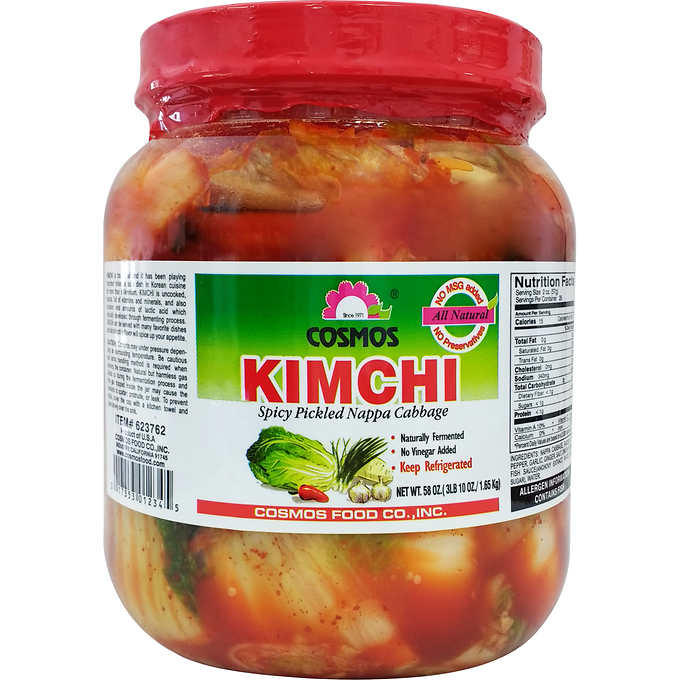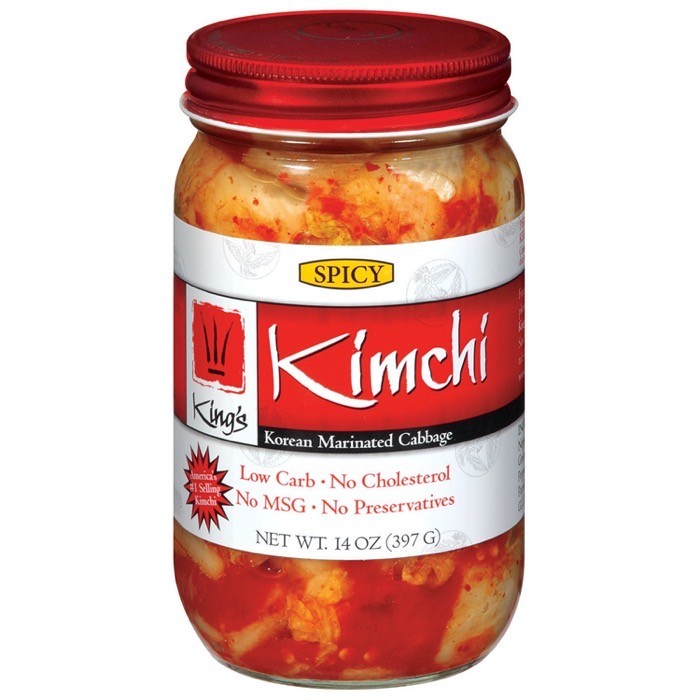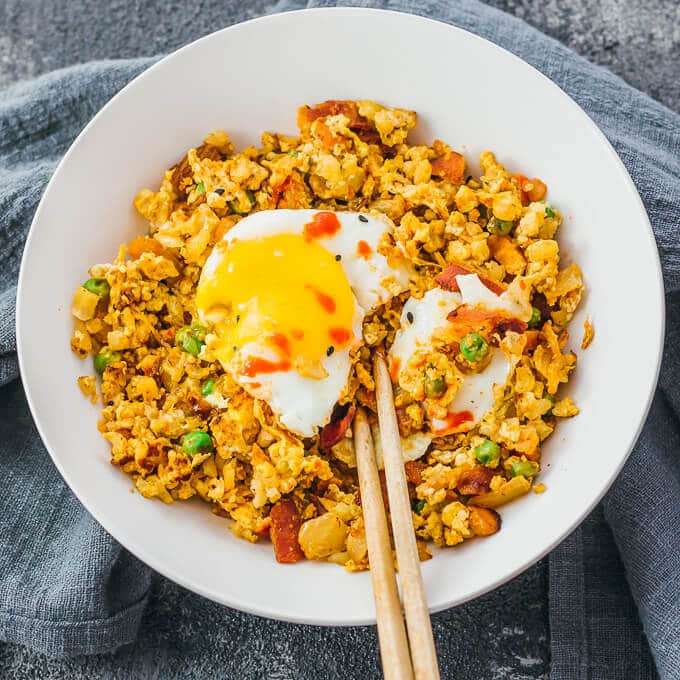Growing up, I ate A LOTTTTTT of kimchi. My best friends and neighbors growing up happened to either be Korean and Chinese, and I spent a good part of my childhood hanging out at their homes (which meant eating a lot of their food). Naturally, I wondered if I could still enjoy this staple in my diet while following a keto diet, and here's what I found.
Kimchi is naturally low in carbohydrates with only 2 grams of net carbs per 1-oz (28g) serving, making kimchi ok to consume while following a keto diet. However, one must be cautious as certain kimchi brands include added sugars, which may raise the net carbohydrates per serving.
Kimchi has always been a part of my diet as far as I can remember, and you either love it or hate it. There's something about that salty-sour, fermentedness, spicy goodness that I enjoy so much.
In this article, I'll cover everything you need to know about kimchi, which brands are best, which to avoid, how to make your own, and so much more.

Whether you like kimchi, dining at a Korean restaurant, or happen to be in Korea, you can rest easy knowing that a little kimchi won't hurt you and your keto efforts.
The primary ingredient in most kimchi recipes is napa cabbage, which is very low in carbohydrates. What you need to look out for are the other ingredients they may have thrown in with the kimchi, more specifically sugar.
Certain brands of kimchi are NOT keto-friendly, but there are plenty of brands you can purchase that don't have added sugars and are keto-friendly.
Or you could always make your own.
I think having kimchi alongside any Korean dish or enjoying some Korean Barbecue (KBBQ), it's almost a necessity, along with some soju, of course.
- Read: Is Soju Keto Friendly?
Table of Contents
How Many Carbs Does Kimchi Have?
How many carbs kimchi has will depend, of course, on the brand or the recipe you are using.
Most kimchi recipes or brands that are keto friendly will have ~4 grams of net carbs per 2 oz (47g) serving.If you're familiar with Korean banchan, which are the small side dishes they generally serve you with any Korean cuisine, 2 oz is about the size of one of those little dishes.

Health Benefits Of Eating Kimchi
You may or may not have heard of the many health benefits of kimchi, especially when it comes to gut health and digestion.
This is because fermented foods like kimchi and sauerkraut are rich in beneficial live bacteria and yeasts, known as probiotics.
Both sauerkraut and kefir are keto friendly sources of probiotics that you may also want to consider on your keto journey.
Nutrient dense
Kimchi makes for a perfect food to add, especially while dieting, and that's because it's nutrient-dense. Meaning, relative to its weight, it has a high vitamin and mineral content.
Just the napa cabbage alone (the main ingredient in kimchi) is rich in vitamin C, beta-carotene, vitamin B complex, over 34 amino acids, and at least 10 different minerals. 1
The fermentation process itself may also develop additional nutrients that are more bioavailable to your body (easily absorbed). 2 3
May strengthen your immune system
A particular strain of lactobacillus found in kimchi may help to boost your immune system, as shown in this test-tube study. 4
May prevent yeast infections
Over 1.4 million women in the U.S. alone are treated for vaginal yeast infections due to an overgrowth of the candida fungus. 5
Animal and test-tube studies suggest certain strains of lactobacillus may help fight candida. Also, multiple isolated strains from kimchi have shown to have antimicrobial properties against candida. 678
May slow aging
In another test-tube study, human cells treated with kimchi experienced extended lifespan. Kimchi may help delay the aging process by regulating inflammation in your body. 9
May reduce inflammation
In one study, kimchi extract given daily for 2-weeks lowered levels of inflammation-related enzymes in mice. 10
The different probiotics and active compounds in fermented foods like kimchi may help fight inflammation. 1112
May aid in weight loss
As I stated earlier, kimchi is nutrient-dense, meaning it's low in calories but high in nutrients. Nutrient-dense foods are perfect for weight loss diets, especially when it comes to managing hunger.
In a 4-week study, eating fresh or fermented kimchi was shown to help reduce body weight, body mass index (BMI), and body fat. 1314
May support heart health
Eating kimchi daily significantly decreased total cholesterol, especially LDL (bad) cholesterol, which is a risk factor for heart disease.15 Also, kimchi may reduce your risk of heart disease because of its antioxidant and anti-inflammatory properties. 16
Kimchi FAQs
What is Kimchi Made Out Of?
Kimchi is made primarily from napa cabbage, which is a type of Chinese cabbage widely used in Asian cuisine. Not to be confused with Napa, CA (wine country).
What Does Kimchi Taste Like?
Kimchi tastes sour and spicy, which also depends on the amount of salt and length of fermentation that was used. I don't think I can think of any other food that I can relate to.
Why is Kimchi So Popular?
Kimchi is a side dish typically served all year with Korean cuisine. You can almost guarantee they will serve you kimchi when you dine at a Korean restaurant.
Is Kimchi Really Spicy?
Spicy is relative, so it depends on your spice tolerance. Some kimchi is prepared spicier than others, but you can rinse it in a little water to reduce the heat.
Do Koreans Eat Kimchi Every Day?
Many Koreans do eat kimchi every day, some every meal, but of course, this doesn't mean everyone does it.
What Do You Eat Kimchi With?
You can eat kimchi with almost anything as a topping or a side dish; the possibilities are endless.
Does Kimchi Need To Be Refrigerated?
Kimchi should be refrigerated for safety reasons and preserve its freshness. The quality of kimchi will begin to deteriorate the longer it's fermented, and keeping kimchi at room temperature will expedite this process.
Should Kimchi Be Eaten Hot or Cold?
You can eat kimchi hot or cold. While most people choose to eat kimchi cold, I find particular individuals who don't like it cold but find it quite enjoyable when grilled or heated.
Can You Eat Kimchi By Itself?
I do, but you can do whatever you want, nobody is judging you.
Keto Friendly Kimchi Brands
Since people's access to different brands almost varies store to store, it's hard to give a list of brands that almost everyone can go out and find.
Most Asian or Korean grocery stores will typically make and sell their own fresh-made kimchi.
Here are a few brands that you may be able to get at your local grocery store, at least from what I've seen.
Trader Joes Kimchi
You know a food is popular when Trader Joe's decides to make its very own version. Trader Joes kimchi has no added sugar and only 4 grams of net carbs per 2 oz (57g) serving.
Cosmos Kimchi

You might be able to snag a big bottle of this at your local Costco. The nutrition label of this particular kimchi says it has only 2 grams of net carbs per 2 oz (57g) serving.
King's Kimchi

King's kimchi is another popular brand of kimchi I've seen at grocery stores like Walmart. King's kimchi may be at your local box grocery store in the refrigerator section.
Homemade Keto Kimchi
You may be surprised to find out just how easy it is to make your own homemade keto friendly kimchi. The best part, you can control the ingredients and make a lot for relatively very little money.
Here is a straightforward kimchi recipe by table for two. https://www.tablefortwoblog.com/how-to-make-homemade-kimchi/
For an easy video showing you how to make kimchi, here is a recipe down below for you to watch.
*sidenote, in many kimchi recipes they use mochiko, a glutinous rice flour. To make the kimchi keto friendly omit this ingredient as shown in the video.
Keto Friendly Ideas Or Recipes Using Kimchi
If you're looking for all sorts of creative ways to use kimchi in your keto-friendly cuisine, here are some ideas to get the juice flowing.
Kimchi stir fry
One of the easiest ways to incorporate kimchi into your ketogenic diet is to stir fry it! Stir-frying is a great way to meld the flavors of your protein (meat) with the kimchi and give it a unique taste.
It's also a great way to introduce kimchi into yours or someone else's diet who may not be too familiar with the flavor of kimchi.
Scrambled eggs or omelet
Yup, you read that correctly! Scrambled eggs with kimchi or thrown in an omelet is a great way to get some added texture and tang into your morning (or evening) eggs.
Bacon kimchi cauliflower fried rice
Make fried rice using cauliflower and chopped kimchi like this recipe below. Take it up a notch with some added fats and protein by topping it with some eggs any way you like them.

Photo and recipe from Savory Tooth
Instant pot low carb kimchi beef stew
If you haven't gotten an instant pot yet, what are you waiting for! This kitchen device is a game-changer. I usually follow this ingredient to a t, but I generally leave out the optional tofu topping.
The Takeaway
Kimchi is not only a keto-friendly side dish or condiment but a nutritious food with a myriad of health benefits.
Be sure to double-check the ingredients list and nutrition label if you are buying a kimchi brand not listed above.
There are plenty of keto-friendly brands, but there are just as many non-keto friendly brands loaded with sugars.
Frequently Asked Questions
How long will kimchi last?
Kimchi when it's kept at room temperature tends to last around a week after opening. Alternatively, if you keep things in the refrigerator it can stay fresh for longer for around 3-6 months.
Does kimchi ever stop fermenting?
When kimchi is exposed to heat the fermentation process will stop. However, if you keep it refrigerated the kimchi will continue to ferment and give you a better taste.
